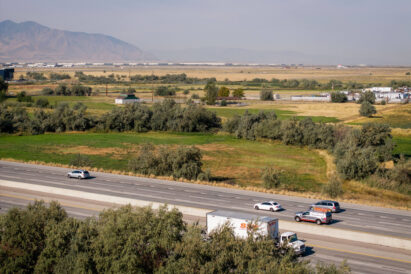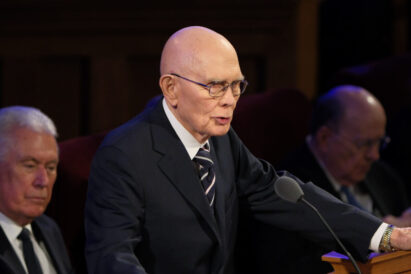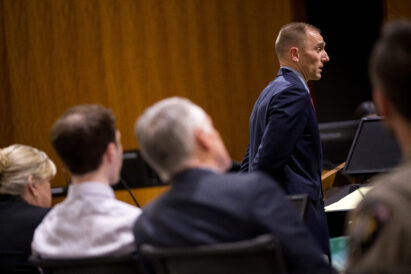LDS Church and Black 14 Philanthropy join hands, again
- John Griffin, left, a member of the Black 14 from the University of Wyoming, and Elder Randall K. Bennett of the Seventy talk near the end of a tour of the Bishops’ Central Storehouse in Salt Lake City on Friday, Sept. 23, 2022.
- Mel Hamilton, far left, and John Griffin, middle, are honored for their philanthropic endeavors prior to the BYU vs. Wyoming football game in Provo on Saturday, Sept. 24, 2022. The two men also ceremonially lit the large Y on the mountain above the football stadium.
History, forgiveness and reaching out to those who often appeared as enemies has once again brought together The Church of Jesus Christ of Latter-day Saints and the 14 Black former University of Wyoming football players dismissed from the group in 1969.
It was that season the Black athletes asked their coach if they could protest, prior to a Brigham Young University game, the policy of the church at the time of not allowing Black people to be ordained to the priesthood. The coach kicked them off the team. In 1978, the church policy was changed and added to the faith’s scriptural canon.
John Griffin and Mel Hamilton were two of the 14 dismissed players. Over the years, the two have joined hands with the church to do good and overcome the past issues.
The Wyoming athletes paid a high price for their request. Griffin said eight of the 14 players, himself included, were likely headed for the National Football League. Only two made it — and Griffin claimed those two lost out on money because of the stigma attached to the group.
Fast forward 53 years later, Griffin and Hamilton are focused on helping their fellow man. They and the nine other surviving members of the “Black 14” started the Black 14 Philanthropy in 2019. The organization educates, feeds and serves those in need.
“It makes me happy that we didn’t let that incident define us for the rest of our lives,” Griffin said Friday during a visit to church headquarters in Salt Lake City. “It’s not about the tragedy. It’s about the philanthropy. It’s what we do now that’s so important. And I think about this every day. What more can I do?”
Some of their work is done in collaboration with the church. The relationship began a few years ago with a conversation between Hamilton and Elder S. Gifford Nielsen of the Seventy. Nielsen was a quarterback with the BYU football in the 1970s.
Since November 2020, the Church of Jesus Christ has donated some 1 million pounds of food to the Black 14 Philanthropy. Food has gone to Colorado, Maryland, Massachusetts, Michigan, Nebraska, North Carolina, South Carolina and Wyoming.
Another shipment of 80,000 pounds of food will be delivered to these locations this November.
In addition to their visit to church headquarters, which included a tour of the 13-acre Bishops’ Central Storehouse and a lunch in the Joseph Smith Memorial Building, Griffin and Hamilton spent Friday and Saturday at BYU. Friday night, they took part in a Q&A after the premiere of a student-produced documentary called “The Black 14: Healing Hearts and Feeding Souls.” And Saturday night, prior to the BYU vs. Wyoming football game, the duo was honored for their philanthropic endeavors before ceremonially lighting the large Y on the mountain above the football stadium in Provo.
Cathedral Home for Children, a youth residential treatment center in Laramie, Wyoming, is one of the beneficiaries of this collaboration. Julius Stinson, a cottage coordinator at the Cathedral Home, was present, along with his wife and children, at this weekend’s events.
“It starts with (the Black 14 Philanthropy) and their connection (with the church), and then it trickles down to us, and we get to take that and give it to our families in need,” said Stinson, who played football for Wyoming from 2005 to 2007. “We have our cottages that need food and supplies. We have a community of families that are in need. We get to give them food and anything else they need.”
At the end of Friday’s lunch, Elder Randall K. Bennett of the Church’s North America Central Area Presidency praised the Black 14 for their example of selflessness and hope.
“John and Mel and the others aren’t self-focused,” said Elder Bennett, whose service area includes Wyoming and Griffin’s home state of Colorado. “You’re like the savior would be. It’s about others. It’s an outward focus. Who do we help? Who do we bless? We know we have the same Father. We’re part of the same family. We’re brothers. We’re just here to help one another.”
“You’re just remarkable examples to us — examples that we need to follow in terms of optimism, forgiveness and focusing on the future, not the past. Thank you,” he added.
“Thank you for bringing us in to your village,” Griffin said. “You know the old adage: It takes a village. Well, that’s what we’re doing.”







